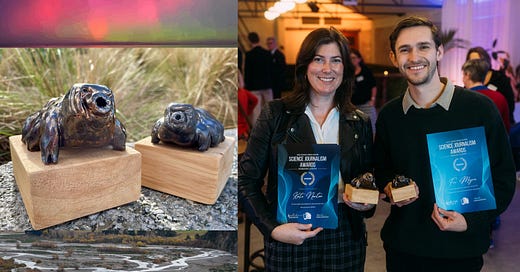✍️Science Writing News Roundup #241
Covering health misinformation: What journalists need to rethink + Digital security for journalists in times of crisis.
Winners of 2025 Science Journalism Awards announced: The winners of this year’s Science Media Centre (New Zealand) Journalism Awards cover the dark side of solar storms and explore the impacts of putting rivers in a straitjacket. Kate Newton of RNZ won this year’s Established Professional category for her In Depth article, “Room for the river,” with designer Hingyi Khong. Fox Meyer of Newsroom won the Emerging Journalist award for “Inevitable solar storms will be catastrophic for energy supply.” This year’s golden tardigrade trophies were designed and sculpted by Wellington-based artist Rebeka Whale, who said she enjoyed thinking about how moss would be like trees for the fascinating little creatures. Image via Science Media Centre (New Zealand)
Welcome! You are reading the Science Writing News Roundup, a newsletter for science writers. You can also read this edition online. Did someone forward you this newsletter? Sign up here.
🧭Opportunities
The Climate Change Media Partnership (CCMP) announced the COP30 CCMP Reporting Fellowship Program for journalists from low- and middle-income countries interested in covering the 30th United Nations Climate Change Conference of the Parties (COP30). Hosted this year by Brazil, the conference is scheduled to take place in the city of Belém from November 10-21, 2025, with the World Leaders’ Summit on November 6-7.
More opportunities and calls for pitches 👉 Bonus content for monthly supporters.
👓Resources
Addressing Science-Related Misinformation and Disinformation: Journalists have the power to slow the spread of misinformation and disinformation. It can be tricky to identify a piece of false information and know how and when to debunk it for your audience. Here are some tips to get you started.
Want to stay safe online? Learn how in this free course on digital security for journalists: The Knight Center for Journalism in the Americas and the Global Investigative Journalism Network have joined forces to offer a new free online course: Digital Security for Journalists in Times of Crisis. The course will run from July 7 to August 3, 2025, and is available in English and Spanish.
Covering health misinformation: What journalists need to rethink. Journalists and public health experts shared 12 strategies for building trust, using careful language and improving coverage of health misinformation during a workshop at the Association of Health Care Journalists' annual conference.
👩💻Articles
From Data to Storytelling: Concept and Design Tips from the Financial Times’ John Burn-Murdoch. “Don’t just make charts for chart people. Make stories for all people.”
This new app wants to help prose-loving journalists make the leap into vertical video. Sophiana wants to turn your semicolon-laden story into something your nephew won’t swipe past.
HHS ‘FAQ’ Distorts Data on COVID-19 Vaccination During Childhood and Pregnancy. A document the Department of Health and Human Services distributed to members of Congress to justify recent changes to COVID-19 vaccine recommendations misrepresented scientific research to make unfounded claims about vaccine safety for pregnant people and children.
US aid cuts curb journalists' access to vital health data in Africa. Scientists and researchers working in global health have called for the restoration of the Demographic and Health Surveys (DHS) program, which tracks health-related data in over 90 low- and middle-income countries.
A Day in the Life of Bijal Trivedi: Bijal P. Trivedi is a former senior science editor for National Geographic and a former science editor for The Conversation. She is the inaugural recipient of the Sharon Begley Science Reporting Award, and her stories have appeared in National Geographic, Scientific American, Discover, New Scientist, and other publications.
✍️News and Announcements
The Xylom needs to raise $7,500 this month to avoid shutting down operations. Losing The Xylom would be a terrible loss for science journalism, and for the early-career journalists around the world for whom this publication has offered income, mentorship, and the opportunity to tell important stories from around the world.
If you value what The Open Notebook does – mentoring early-career science writers; creating free resources for anyone covering science, health and the environment; creating community – consider supporting TON with a gift today!
Calling all science journalists whose work is predominantly published or broadcast in the UK: Please take a few minutes to complete this new survey about barriers to starting a science journalism career and challenges when working as a science journalist, such as online harassment.
2025 NASW Diversity Summer Fellowships celebrate six trainees pursuing science writing internships. The National Association of Science Writers congratulates Anna Hu, Annika Inampudi, Celina Zhao, Elizabeth Walsh, Gaea Cabico, and Pratik Pawar on receiving their 2025 NASW Diversity Summer Fellowships.
💡Events
Climate, the Big Beautiful Bill and You: The Jobs/Projects at Risk Near You (June 26, 2025)
More events 👉 Bonus content for monthly supporters.
🎯Jobs
Thanks for reading! Subscribe for free to receive the next post in your inbox:
Worried you missed something? See previous posts here. What would you like to see in the newsletter? Please send me your suggestions: sciencewriting@substack.com



